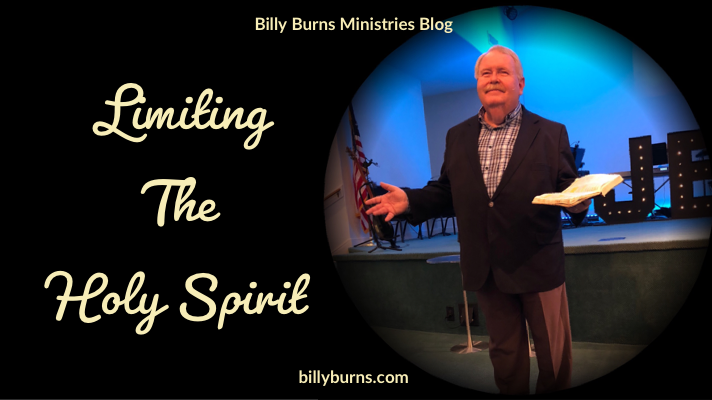
One of the greatest mistakes that we can make as Christians is to limit the Person and work of the Holy Spirit. We can be honest, right? We all are guilty of doing this … including us as ministers … or, more accurately, especially us as ministers. To lessen the pain of honesty, I will go beyond those who stand behind a pulpit and include anyone and everyone involved in some type of leadership in the church, be it in the children’s ministry or youth ministry or Sunday school classroom or senior adult ministry or music ministry or … you can add to the list.
This isn’t a new problem. We can read about limiting the Holy Spirit in the early church in the book of Acts. You might want to grab your Bible to follow along with me.
In Acts 6, we read about the leadership of the Jerusalem church recognizing the need to strengthen its ministry team and so they selected seven men who were of “honest report, full of the Holy Ghost and wisdom.” (Acts 6:3) Not long afterwards, we read that one of these seven individuals named Philip left Jerusalem, moved to Samaria, and started an incredibly great church. In Acts 8, the author of Acts writes of a work taking place that any pastor would want to see:
- Multitudes were born again and baptized in water
- People were liberated from demonic spirits
- Miraculous demonstrations of God’s power happened
- Great joy filled Samaria
But, amongst all of the great things, there was one great need, one that perhaps Pastor Philip didn’t recognize. His church was growing. It was “the” church in Samaria. There wasn’t any other church like Philip’s church. So, what could be lacking?
While Spirit-filled Pastor Philip was mightily used by the Holy Spirit, from what we can read in Acts 8, Philip didn’t communicate about the Source of his power nor make it possible for those in his ministry to be filled with the Holy Spirit. The church grew because of the people “hearing and seeing the miracles which he did.” (Acts 8:6) Did you catch the words “which he did”? Evidently, being baptized in the Holy Spirit and having the demonstrations of the working of the Holy Spirit were limited to Philip. Thankfully, the church leadership in Jerusalem learned of this situation and “… sent unto them Peter and John: Who, when they were come down, prayed for them, that they might receive the Holy Ghost.” (Acts 8:14-15) To the leadership in Jerusalem, being baptized and empowered by the Holy Spirit wasn’t a “leader’s-only” mandate. They recognized that every believer should be Holy Spirit filled so that they too could accomplish what was seen and heard in the life of their pastor.
Let me bring this biblical account up to where we see today’s church. All across America, many great churches are pastored and led by present-day Philips. The leaders (pastors, children’s pastors, youth pastors ….) are Jesus-loving, Word-believing individuals who, like Philip, are honest, full of the Holy Ghost and wisdom. These leaders know the value and benefits of being filled with the Holy Spirit and praying in their prayer language. However, for whatever reason, they haven’t provided an opportunity for those in their ministry to obey the command given to every believer. (Acts 1:4; Ephesians 5:18).
Thank God for how He uses us as we preach to our congregation or teach our Sunday school class or give oversight to our area of ministry. But, eventually, our service or class will be over and people will go back to their home and not be back at our church for another 167 hours. Once they leave our building, will they be equipped “to turn their world upside down” (Acts 17:6) or will they have to bring people (school classmates, family members, work associates, etc.) to our service/class to hear and see the miracles that the present-day Philip does?
Leader, will we continue to limit and restrain the Holy Spirit? Will we maintain a “leader’s-only” way of ministry or will we multiply ourselves by making it possible for every believer to be mightily used by God’s Spirit? Your answer is?




